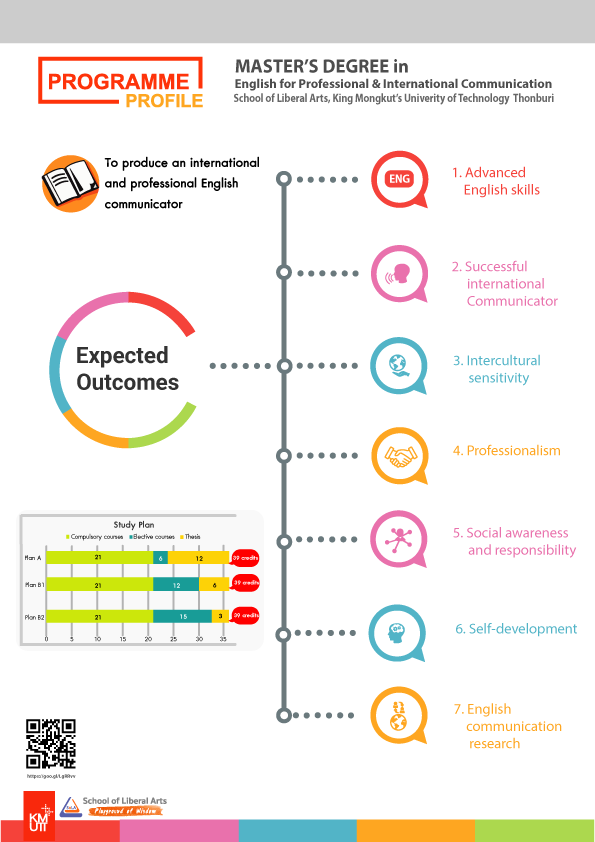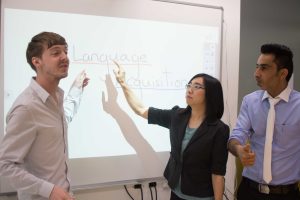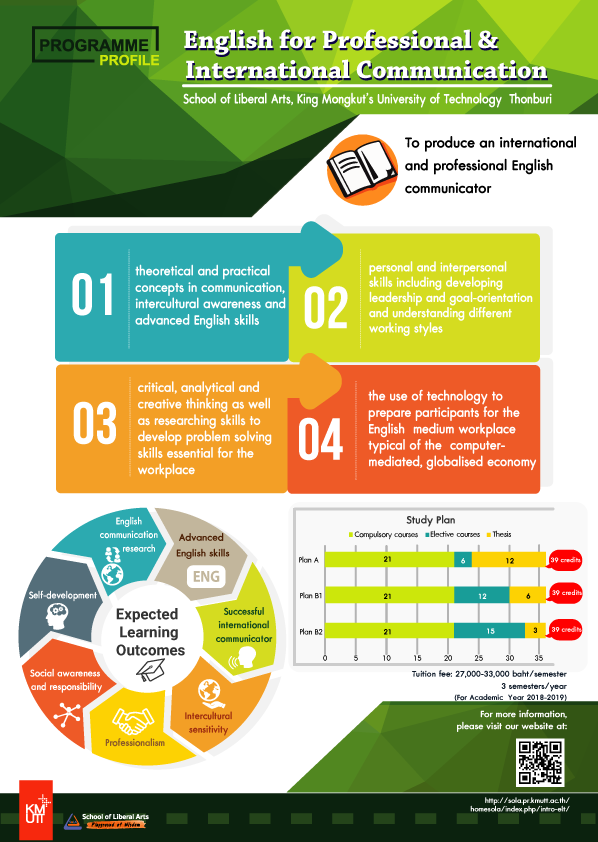Introduction
OPINIONS

THE PROGRAMME

Degree
Master of Arts (English for Professional and International Communication)
Offered by
Department of Language Studies School of Liberal Arts
King Mongkut’s University of Technology Thonburi
The philosophy of the MA in English for Professional and International Communication (EPIC) is to ensure that participants gain a profound theoretical and practical understanding of what is required to communicate in professional settings.
Graduates from this program will be equipped with an advanced level of English combined with a high level of ability to communicate in the workplace as well as equipped with the tools needed to be able to analyze and use English in various professional settings. Graduates will have a competitive edge in the job market. In order to achieve this, this English-medium program focuses on professionalism involving:
1. theoretical and practical concepts in communication, intercultural awareness and high English skills;
2. interpersonal skills including developing leadership and goal-orientation, and understanding different working styles
3. critical, analytical and creative thinking as well as researching skills to develop problem solving skills essential for the workplace.
4. the use of technology to prepare participants for the English medium workplace typical of the computer-mediated, globalized economy
Teaching Staff
Full time staff
| Name | Major | Research area |
| Asst. Prof. Dr. Wannapa Trakulkasemsuk | English as an International Language (2008, Chulalongkorn University, Thailand) | World Englishes, English as a Lingua Franca, language and communication |
| Asst. Prof. Dr. Woravut Jaroongkhongdach | Applied Linguistics (2012, King Mongkut’s University of Technology Thonburi, Thailand)Applied Linguistics (2012, Macquarie University, Australia) | Written discourse, Research writing |
| Assoc. Prof. Sonthida Keyuravong | Curriculum and Instruction (1981, University of Kansas, U.S.A.) | Self-access learningTechnology in language learning and teachingCourse design and materials development |
| Dr. Sompatu Vungthong | Early Childhood (2017, Macquarie University, Australia) | ELT, Critical Discourse Analysis, Semiotics, Postmodern Literature |
| Asst. Prof. Dr. Wareesiri Singhasiri | Applied Linguistics (2001, University of Essex, U.K.) | Research methodology in ELT, learning strategies, learning styles and self-directed learning |
| Asst. Prof. Dr. Atipat Boonmoh | Applied Linguistics (2009, University of Warwick, U.K.) | Dictionary use, lexicography, autonomy, new technologies and language learning |
| Asst. Prof. Dr. Natjiree Jaturapitakkul | English as an International Language (2008, Chulalongkorn University, Thailand) | Language assessment, standardized test development, ESP testing, language learning and teaching |
| Dr. Phanitphim Sojisirikul | English Language Studies (2009, Suranaree University of Technology, Thailand) | Approaches and methodologies, Course and curriculum development, Information and communication technology (ICT) in language teaching, English language testing |
| Assoc. Prof. Dr. Pornapit Darasawang | TESOL (2000, University of Edinburgh, U.K.) | Learner autonomy, self-access learning |
| Assoc. Prof. Dr. Richard Watson Todd | English Language Studies (2003, University of Liverpool, U.K.) | Discourse analysis, educational innovation |
| Asst. Prof. Dr. Saowaluck Thepsuriwong | Applied Linguistics (2000, University of Reading, U.K.) | Reading strategies, ELT |
| Asst. Prof. Dr. Pamararat Wiriyakarun | English as an International Language (2007, Chulalongkorn University, Thailand) | Curriculum development, program evaluation,task-based learning, learning strategies andlearner autonomy |
| Dr. Hayo Reinders | Applied Language Studies & Linguistics (2005, University of Auckland, New Zealand) | The role of technology in learning and teaching, learner autonomy, self-access, task-based language teaching, language processing (attention and noticing), mobile learning |
| Dr. Phanitphim Sojisirikul | English Language Studies (2009, Suranaree University of Technology, Thailand) | Approaches and methodologies, Course and curriculum development, Information and communication technology (ICT) in language teaching, English language testing |
| Dr. Kitcha Thepsiri | Educational and Applied Linguistics (2006, Newcastle University, U.K.) | Socio-cultural Perspectives including Task-based and Project-based Learning, Attribution and Motivation, Teaching and Learning Strategies |
Teaching Staff
| Name | Major | Research area |
| Dr. Ornkanya Yaoharee | Cultural Perspectives and Comparative Education (2013, University of California, Santa Barbara, U.S.A) | pragmaticsintercultural communicationinternationalizationEnglish in workplace communication |
| Dr. Punyapa Saengsri | English as an International Language(2008, Chulalongkorn University, Thailand) | Assessment and Evaluation Information in ELT and communication technology (ICT) in language teaching, |
| Asst. Prof. Thanis Bunsom | English (2010, Chulalongkorn University, Thailand) | Language and Identity, English in East Asia,Post-colonial Literature |
| Ms. Rachanee Dersingh | Commerce in Marketing (2000, University of Wollongong, Australia) | Communication strategiesSecond language acquisition |
Part-time Staff
| Name | Major | Research area |
| Dr. Pasakara Chueasuai | Translation Studies (2010, University of Manchester, U.K.) | Systemic Functional Linguistics, Social SemioticsVisual Semiotics, Cross-cultural CommunicationTranslation |
| Asst. Prof. Dr. Apisak Pupipat | Applied Linguistics (1998, Columbia University, U.S.A.) | Using various media in English language teaching, eg. comic strips, songs, films advertisementsand jokes, Organizing English camps,Scientific English |
| Dr. Jonathan Rante Carreon | Applied Linguistics (2014, Macquarie University, Australia)Applied Linguistics (2012, King Mongkut’s University of Technology Thonburi, Thailand) | corpus-based and multimodal approaches to (critical) discourse analysis that involves data from professional medical communications and medical classroom settings. |
| Ms. Kunthida Rungruengkiat | Intercultural Communication(2009, University of Jyväskylä, Finland) | Intercultural Communication, English language, Languages and Linguistics, and Culture |
Program committee
- Asst. Prof. Dr. Wannapa Trakulkasemsuk (Program director)
- Assoc. Prof. Sonthida Keyuravong (Committee member)
- Asst. Prof. Dr. Sompatu Vungthong (Committee member)
Admission

Applicants must hold a Bachelor’s degree in any field from an accredited academic institution.
To assess applicants’ English, they can either take the KMUTT internal language proficiency test, or produce evidence of having achieved the following IELTS, TOEFL scores.
| IELTS | TOEFL IBT |
| 6 | 78 |
Suitable applicants with insufficient English are required to take a non-credit English Language Improvement course.
Selection is based on two aspects: written exam and interview. The Admissions Committee’s carefully evaluate the applicants’ written exam, academic history, English Proficiency Test results, recommendations, interviews, and commitment to completion of the program.
Admissions Schedule for Thai students : Available on April 11, 2022
Admissions Schedule for International students : Available on April 11, 2021
Study Plans

This programme is for weekend study (2 years), and the courses are conducted in English. Classes are normally scheduled on Saturdays and Sundays from 9.00 to 16.00.
Participants spend time on Sundays doing group work, assignment, reading, and/or consulting with tutors. The applicants can choose either of the three study plans: Plan A (12 credit thesis) and Plan B (6 credit research), and Plan B (3 credit independent study).
Both plans consist of the following components:
| Plan A (12 credit thesis) | |
| Compulsory courses | 21 Credits |
| Elective courses | 6 Credits |
| Thesis | 12 Credits |
| Total | 39 Credits |
| Plan B (6 credit research) | |
| Compulsory courses | 21 Credits |
| Elective courses | 12 Credits |
| Thesis | 6 Credits |
| Total | 39 Credits |
| Plan B (3 credit independent study) | |
| Compulsory courses | 21 Credits |
| Elective courses | 15 Credits |
| Thesis | 3 Credits |
| Total | 39 Credits |
Curriculum
Course Description

- Foundation Courses
EPC 511 การอ่านเชิงวิชาการ 3(3-0-9)
Academic Reading
Pre-requisite : None
ทักษะการอ่านภาษาอังกฤษทางวิชาการ ซึ่งรวมทักษะการจดโน้ตเพื่อความเข้าใจ การอ่านหนังสือเรียน บทความทางวิชาการและบทความวิจัย ศัพท์ทางวิชาการและศัพท์เฉพาะทางการสื่อสาร เทคนิคการเรียนศัพท์ การอ่านเชิงวิพากษ์ ทักษะการคิดซึ่งรวมการคิดวิเคราะห์และสังเคราะห์ การให้เหตุผล การตีความ และการโต้แย้งอย่างมีเหตุผล
Academic reading skills which include note-taking skills, reading textbooks, and academic and research articles. Academic vs technical vocabulary. Vocabulary learning strategies. Critical reading. Thinking skills which include analyzing, synthesizing, reasoning, interpreting and understanding arguments.
Learning outcomes:
At the end of the course, students can
- identify their own learning strategies for academic and technical vocabulary in communication
- read textbook chapters and academic and research articles and take notes for understanding using methods and formats such as mind mapping, Cornell notes, etc.
- read academic and research articles and evaluate the arguments
- read research articles and identify their IMRD components
EPC 512 การเขียนเชิงวิชาการ 3(3-0-9)
Academic Writing
Pre-requisite : None
ปัจจัยพื้นฐานการเขียนทางวิชาการ คุณภาพของงานเขียน (ความชัดเจน ความต่อเนื่อง เหตุผล และเอกภาพ) การเขียนที่เน้นกระบวนการ (การระดมสมอง การเขียนเค้าโครง การร่าง การปรับแก้เนื้อหาและแก้ไขภาษา) การเลือกหัวข้องานเขียน กระบวนการให้เหตุผล การค้นคว้าข้อมูลจากแหล่งต่างๆ การอ่านแบบวิพากษ์และการทำโน้ตย่อ การเรียบเรียงเนื้อหาและการพัฒนาโครงร่างสำหรับการเขียน การสังเคราะห์ การอ้างคำพูด การกล่าวซ้ำและการสรุปความเพื่อหลีกเลี่ยงการคัดลอก การอ้างอิง
Fundamentals of academic writing. Quality of writing (clarity, coherence, logic and unity). Process writing (brainstorming, outlining, drafting, revising and editing). Selection of research topic. Developing an argument and reasoning. Searching for information from different sources. Critical reading and note-taking. Organizing ideas and developing an outline. Synthesizing ideas. Quoting, paraphrasing and summarizing to avoid plagiarism. Referencing.
Learning outcomes:
At the end of the course, students can
- write an academic paper using process approach of writing
- provide appropriate citations and references, no plagiarism
- Compulsory courses
EPC 521 วาทกรรมทางวาจาเพื่อการสื่อสารในวิชาชีพ 3(3-0-9)
Spoken Discourse for Professional Communication
Pre-requisite : None
ปริจเฉทวิเคราะห์ ความหมายและลักษณะของวาทกรรมทางวาจา ทฤษฎีวาทกรรมทางวาจาต่างๆ ทฤษฎีการวิเคราะห์วาทกรรมทางวาจา การวิเคราะห์วาทกรรมทางวาจาเพื่อการสื่อสารอย่างมีประสิทธิภาพในบริบทงานอาชีพต่างๆ งานวิจัยทางการวิเคราะห์วาทกรรมทางวาจา
Genre analysis. Definition and characteristics of spoken discourse. Spoken discourse concepts. Theories of spoken discourse analysis. Analyzing spoken discourse for effective communication in professional context. Research in spoken discourse analysis.
Learning outcomes:
At the end of the course, students can
- identify relevant features of spoken discourse in their analysis of work-related texts
- make independent analyses of spoken discourses using theories to improve their own workplace communication
EPC 522 วาทกรรมในงานเขียนเพื่อการสื่อสารในวิชาชีพ 3(3-0-9) Written Discourse for Professional Communication
Pre-requisite : None
ความหมายและลักษณะของวาทกรรมในงานเขียน ทฤษฎีวาทกรรมในงานเขียนต่างๆ ทฤษฎีการวิเคราะห์วาทกรรมในงานเขียน การวิเคราะห์วาทกรรมในงานเขียนในบริบทงานอาชีพต่างๆ งานวิจัยทางการวิเคราะห์วาทกรรมในงานเขียน
Definition and characteristics of written discourse. Written discourse concepts. Theories of written discourse analysis. Analyzing written discourse for effective communication in professional context. Research in written discourse analysis.
Learning outcomes:
At the end of the course, students can
- identify types of written texts
- identify relevant features of written discourse in their analysis of work-related texts
- make independent analyses of written discourses using theories such as genre analysis and corpus analysis
EPC 551 หลักการสื่อสารและการใช้ภาษา 3(3-0-9)
Principles of Communication and Language Use
Pre-requisite : None
องค์ประกอบ รูปแบบและทฤษฎีการสื่อสารของมนุษย์ หลักการสื่อสารเชิงวัจนะ อวัจนะ และสัญศาสตร์ และการประยุกต์ใช้หลักการสื่อสารในบริบทงานอาชีพระหว่างบุคคล กลุ่ม และองค์กร การสื่อสารระหว่างวัฒนธรรม จรรยาบรรณในการสื่อสารในงานอาชีพ การสื่อสารผ่านเทคโนโลยีสารสนเทศ การประยุกต์ใช้ทฤษฎีการสื่อสารต่างๆสู่การใช้ภาษาอังกฤษ งานวิจัยทางด้านการสื่อสาร
Elements, models and theories of human communication. Principles of verbal, and non-verbal communication and semiotics and their applications in workplace contexts including interpersonal, groups and teams, and organization. Intercultural communication. Ethics in professional communication. Communication via information technology. Applying communication theories to English language use. Research in communication.
Learning outcomes:
At the end of the course, students can
- identify elements and models of verbal and non-verbal communication in their workplace
- solve workplace problems that arose from intercultural misunderstanding
- identify problems of online communication using communication theories
- organize a seminar to address communication issues in the workplaces
- identify topics and elements of research in communication
EPC 552 ภาษาอังกฤษในฐานะภาษานานาชาติ 3(3-0-9)
English as an International Language
Pre-requisite : None
สถานะของภาษาอังกฤษในฐานะภาษากลางในการสื่อสาร ความเป็นมาและความสำคัญเชิงสังคมและวัฒนธรรม กระบวนการการเปลี่ยนแปลงของภาษาและการสร้างรูปแบบภาษา มุมมองต่อภาษาอังกฤษรูปแบบต่างๆ ทั่วโลก รวมถึงภาษาอังกฤษในประเทศไทย การใช้ภาษาอังกฤษของผู้ใช้ทั้งที่เป็นเจ้าของภาษาและไม่เป็นเจ้าของภาษา ความเข้าใจในการสื่อสาร และการยอมรับรูปแบบของภาษาอังกฤษของผู้ใช้ที่ไม่ใช่เจ้าของภาษา อิทธิพลจากเทคโนโลยีที่มีผลต่อการใช้ภาษาอังกฤษในบริบทของการทำงาน
Status of English as an international lingua franca. Historical and socio-cultural significance. The process of language change: nativisation / localisation, codification and institutionalisation. Views on different varieties of English around the world including English in Thailand. Use of English among native and non-native speakers. Intelligibility and acceptance of non-native varieties of English. Technological influence on the use of English in professional settings.
Learning outcomes:
At the end of the course, students can
- 1. describe current English situation in international contexts
- 2. explain language use using basic linguistic theories
- 3. use linguistic knowledge to discuss different English varieties
- 4. adjust themselves to understand English speakers of different varieties
EPC 553 การสื่อสารระหว่างวัฒนธรรม 3(3-0-9)
Intercultural Communication
Pre-requisite : None
การสื่อสารและวัฒนธรรม ความตระหนักถึงประเด็นทางด้านวัฒนธรรม อคติแบบเหมารวม ความหลากหลายระหว่างวัฒนธรรม ความคาดหวังและวิธีการสื่อสารด้วยความเข้าใจในความหลากหลายทางวัฒนธรรม ประเด็นต่าง ๆ อันเป็นผลจากการสื่อสารข้ามวัฒนธรรม และประเด็นเรื่องเพศในหน่วยงาน อิทธิพลของวัฒนธรรมอันส่งผลต่อการสื่อสารผ่านภาษา เช่น ภาษาอังกฤษ อวัจนภาษา และการสื่อสารผ่านสื่อ คอมพิวเตอร์ สมรรถนะเชิงวัฒนธรรม
Communication and culture. Cultural awareness. Stereotyping. Cross-cultural diversity. Varying expectations and different ways of communicating politely across cultures. Issues in intercultural communication process and gender issues in the workplace. Influences of culture on intercultural communication in English, in verbal, non-verbal and computer-mediated communication. Intercultural competence.
Learning outcomes:
At the end of the course, students can
- describe and apply intercultural communication theories and principles in their assignments related to their work context
- identify communication in intercultural settings
- present their own culture as an influence in intercultural situations
- apply relevant theories in research in intercultural communication and other interdisciplinary fields
- plan an intercultural training workshop to improve intercultural competency of their colleagues
EPC 561 วิธีวิจัยทางการสื่อสาร 3(3-0-9)
Research methods in communication
Pre-requisite : EPC 521 Spoken Discourse for Professional Communication
EPC 551 Principles of Communication and Language Use
ความรู้เบื้องต้นเพื่อการวิจัยทางด้านการสื่อสาร กระบวนทัศน์การวิจัยและการออกแบบงานวิจัย งานวิจัยเชิงปริมาณและเชิงคุณภาพ ข้อควรพิจารณาในการวิจัย ได้แก่ ตัวแปรต่างๆ การเลือกกลุ่มประชากร ความเที่ยงตรงและความเชื่อมั่น การสร้างกรอบการวิจัย การเก็บรวบรวมข้อมูล เครื่องมือวิจัย การวิเคราะห์และการตีความข้อมูลเชิงปริมาณและเชิงคุณภาพ การเขียนโครงงานวิจัยและรายงานการวิจัย จริยธรรมในการวิจัย
Introduction to communication research. Research paradigms and research designs. Quantitative and qualitative approaches. Consideration in doing research: variables, subject selection, reliability and validity. Setting up a research framework. Data collection. Research instruments. Analyzing and interpreting quantitative and qualitative data. Writing up a research proposal and a research paper. Ethical issues in conducting research.
Learning outcomes:
At the end of the course, students can
- conduct research in communication (the process includes generating a research question, identifying and making use of relevant literature for research, identifying potential data sources appropriate for the research question, and analyzing data)
- write a research paper
EPC 651 ประเด็นร่วมสมัยในการสื่อสารในวิชาชีพ 3(3-0-9)
Contemporary Issues in Professional Communication
Pre-requisite : EPC 561 Research Methods in Communication
ประเด็นร่วมสมัยในการสื่อสารโดยใช้ภาษาอังกฤษ ประยุกต์ความรู้และประสบการณ์จากการทำงานสู่การอภิปรายในชั้นเรียนและการนำเสนองาน ค้นหาประเด็นเกี่ยวกับภาษาอังกฤษในการสื่อสารที่ตนเองสนใจและประมวลเข้ากับทฤษฎีเพื่อสร้างหัวข้อวิจัย ค้นคว้าวรรณกรรม อ่านวิเคราะห์ และเขียนทบทวนวรรณกรรม
Contemporary issues in English communication. Applying work-related knowledge and experience in class through class discussion and oral presentation. Finding areas of interest and applying theoretical concepts from readings to develop a research topic. Searching for related literature, critical reading, and writing literature review.
Learning outcomes:
At the end of the course, students can
- explain current trends and issues in English communication
- identify their own research interest
- critically read and discuss research papers in the field of English studies and English communication
- write a literature review with good synthesis of information from different resources
- Elective courses
EPC 531 การสื่อสารในองค์กรยุคโลกาภิวัตน์ 3(3-0-9)
Organizational Communication in the Globalized Era
Pre-requisite : None
หลักการและลักษณะของการสื่อสารในองค์กร การพูดวิสาสะและการพูดคุยทางธุรกิจ ความสุภาพและอำนาจในองค์กร วัฒนธรรมองค์กร การสื่อสารอย่างมีประสิทธิภาพในองค์กร วาทกรรมทางวาจาและงานเขียนในบริบทงานอาชีพ การรู้ดิจิทัล
Principles and characteristics of communication in the organization. Small talk and business talk. Politeness and power in the workplace. Corporate culture. Successful workplace communication vs miscommunication. Workplace spoken and written discourse. Workplace narrative. Digital literacy.
Learning outcomes:
At the end of the course, students can
- identify their organization culture and communication styles
- examine their strengths and weaknesses of their communication styles in the organization and devise a plan for improvement
- present, conduct meetings, discuss, and negotiate business- or workplace-related issues effectively
- write e-mails, memos, etc. of business- or workplace-related issues effectively
- solve problems related to workplace communication issues
EPC 541 การนำเสนอแบบมืออาชีพและการพูดในที่ชุมชน 3(3-0-9)
Professional Presentations and Public Speaking
Pre-requisite : None
ประเด็นต่างๆของการนำเสนอแบบมืออาชีพและการพูดในที่ชุมชน จริยธรรมในการพูดในที่ชุมชน รูปแบบการนำเสนอและสุนทรพจน์ประเภทต่างๆ การวิเคราะห์สุนทรพจน์ โครงสร้างและการเตรียมเนื้อหา เทคนิคการขยายใจความหลักและตรึงความสนใจ ภาษา ลีลาและเทคนิคการพูด การให้ข้อมูลย้อนกลับแบบสร้างสรรค์ การใช้เทคโนโลยีในการนำเสนอ
Issues in professional presentations and public speaking. Ethics of public speaking. Various types of presentations and speeches. Speech analysis. Speech structures and development. Techniques in supporting main points and maintaining interest. Language, delivery and delivery techniques. Giving constructive feedback. Technology in presentations.
Learning outcomes:
At the end of the course, students can
- deliver effective presentations and speeches including business presentations, and speeches of introduction, narration, informative, and persuasion
- use appropriate technology in presentations
- give effective impromptu speeches with confidence
EPC 621 สัญศาสตร์ประยุกต์ในการสื่อสาร 3(3-0-9)
Applied Semiotics in Communication
Pre-requisite : None
แนวคิดและหลักการเบื้องต้นของสัญศาสตร์ทางสังคม แนวคิดเบื้องต้นของกรอบทฤษฎีสำหรับการวิเคราะห์ภาษา การออกแบบทัศนศิลป์ กริยาท่าทาง พื้นที่ และความสัมพันธ์ของภาพและภาษา ตามหลักมุมมองของสัญศาสตร์ทางสังคม ประยุกต์ใช้กรอบทฤษฎีสัญศาสตร์ทางสังคมในการวิเคราะห์ข้อมูลและปฏิสัมพันธ์ในที่ทำงาน
Basic concepts and principles of social semiotics. Basic concepts of frameworks for an analysis of language, visual design, gesture, space and visual-verbal relations through a social semiotic perspective. Applying a social semiotic analysis to workplace-related texts and interactions.
Learning outcomes:
At the end of the course, students can
- use a social semiotic framework to analyse language use in the workplace.
- use a social semiotic framework to analyse visual design of workplace-related texts.
- use a social semiotic framework to analyse visual-verbal relations in workplace-related texts.
- use a social semiotic framework to analyse the use of gesture and space in workplace interactions.
- use a relevant social semiotic framework to analyse workplace-related texts of their own interest.
EPC 622 ภาษาและการรู้จักใช้สื่อ 3(3-0-9)
Media Language and Literacy
Pre-requisite : None
ทฤษฎีการใช้สื่อ เนื้อหา บทบาทและหน้าที่ของสื่อ วิเคราะห์ภาษาและวาทศาสตร์ในสื่อประเภทต่างๆ สื่อและเพศสภาพ สื่อและคตินิยม และการประเมินเนื้อหาในสื่อและผลกระทบต่อสังคม
Theoretical approaches to media. Media content, roles and functions of media. Analyzing the rhetorical language of media. Media and gender. Media and ideologies. Assessing media content and impact on societies.
Learning outcomes:
At the end of the course, students can
- explain the theories of media and literacy
- explain the roles and functions of media in the modern world
- identify the patterns of rhetorics and language of different media types
- idenitfy the messages that represent different ideologies
- decide and justify which media content is appropriate
EPC 631 การแปลเพื่อวิชาชีพ 1 3(3-0-9)
Translation for Professional Purposes I
Pre-requisite : None
หลักและทฤษฎีในการแปล การศึกษาเปรียบเทียบระหว่างภาษาไทยและภาษาอังกฤษ ภาษาและวัฒนธรรมในการแปล การฝึกปฏิบัติในการแปลทั้งจากภาษาไทยเป็นภาษาอังกฤษและภาษาอังกฤษเป็นภาษาไทยในบริบททางวิชาชีพ การวิเคราะห์ข้อผิดพลาดในการแปล การวิเคราะห์ปัญหาในการแปล เทคโนโลยีสำหรับการแปลและข้อจำกัด
Principles and theories of translation. Contrastive analysis of English and Thai languages. Language and culture in translation. Practical translation both from Thai to English and from English to Thai in professional contexts. Error analysis in translation. Analyzing problems in translating. Technologies for translation and their limitations.
Learning outcomes:
At the end of the course, students can
- conduct contrastive analysis of English and Thai languages to identify major areas of problems in translating work-related documents for further improvement
- translate various text types from Thai to English and English to Thai using translation theories such as sense for sense, and word for word theories
- identify errors in their own translation works and edit them for better results use available technology to support translation work
EPC 632 การแปลเพื่อวิชาชีพ 2 3(3-0-9)
Translation for Professional Purposes II
Pre-requisite : None
ศึกษาและเข้าใจกระบวนการการแปลขั้นสูง ใช้ทักษะและเทคนิคในการแปลบทความประเภทต่างๆ จากภาษาไทยเป็นภาษาอังกฤษและภาษาอังกฤษเป็นภาษาไทย สำรวจปัญหาหลักๆในการแปลและการหาทางแก้ปัญหา การใช้เทคโนโลยีต่างประเภทเพื่อเพิ่มประสิทธิภาพในการแปล ฝึกทักษะการเป็นนักแปลมืออาชีพ จรรยาบรรณการเป็นนักแปลมืออาชีพ ล่าม
Learning and understanding the process of translation at the advanced level. Applying skills and techniques in the translation of a wider range of text types from Thai to English and from English to Thai. Exploring key problems in translations and their solutions. Using computational tools as translation aids to help increase translation efficiency. Mastering skills of professional translators. Professional translator ethics. Interpretation.
Learning outcomes:
At the end of the course, students can
- explain the process of advanced translation
- translate complex, context-specific texts from English to Thai and Thai to English
- identify key problems in translation and solve them
- use various computational resources such as corpora and terminology tools in their translation
- explain ethics of professional translators
EPC 633 ภาษาและสารในวรรณคดี 3(3-0-9)
Language and Communication in Literature
Pre-requisite : None
วรรณคดีในฐานะสาร วิเคราะห์ภาษาในงานเขียนประเภทร้อยแก้ว ร้อยกรอง และบทละคร ทฤษฎีการวิพากษ์งานเขียน การใช้ภาษาภาพพจน์ในงานเขียนวรรณกรรม บทสนทนาในงานวรรณคดี โครงสร้างการเล่าเรื่อง ความหมาย มุมมอง และการตีความ และวิเคราะห์บริบททางประวัติศาสตร์ สังคมและวัฒนธรรม
Literature as communication. Analysing the language of prose, poetry and drama. Critical approaches to literary texts. Figurative language in literature. Dialogues in literature. Narrative structure. Meaning, point of view and interpretation. Examining historical, social and cultural contexts in literature.
Learning outcomes:
At the end of the course, students can
- explain the characteristics of each literary genre
- identify the linguistic features in literary texts
- explain their understanding and interpretation of literary texts based on selected critical theories in writing and speaking
- explain how narratives are created and structured
- identify the dialogical patterns of the characters
- explicate how history, society and culture influence the making and reading of literary texts
EPC 634 เทคโนโลยีและการใช้ภาษา 3(3-0-9)
Technology and Language Use
Pre-requisite : None
วาทกรรมของการสื่อสารบนอินเทอร์เน็ตและการสื่อสารของมนุษย์ รูปแบบและลักษณะของการสื่อสารบนอินเทอร์เน็ต ภาษาศาสตร์ ภาษาศาสตร์สังคมและวัจนปฏิบัติศาสตร์ของการสื่อสารบนอินเทอร์เน็ต การสื่อสารระหว่างวัฒนธรรมบนอินเทอร์เน็ต การใช้การสื่อสารบนอินเทอร์เน็ตและการใช้เครื่องมือเทคโนโลยีในการสื่อสารในสถานที่ทำงาน ภาษาศาสตร์คลังข้อมูลและการประยุกต์ใช้คลังข้อมูลภาษาในการพัฒนาการใช้ภาษา การใช้โปรแกรมคอมพิวเตอร์ที่ช่วยสนับสนุนการใช้ภาษาต่างๆ อย่างมีวิจารณญาน งานวิจัยทางด้านภาษาและเทคโนโลยี
Internet discourse and human communication. Mode and medium of computer-mediated communication (CMC). Linguistics, sociolinguistic and pragmatic perspectives on CMC. CMC as intercultural communication. Application of CMC and technological tools in the workplace. Corpus linguistics and its application to language use. Critical use of computer-based support tools. Research in language and technology.
Learning outcomes:
At the end of the course, students can
- use appropriate technology and language in communication in the workplace
- develop a corpus of specialized English used in the workplace
- use computer-based support tools such as spell checkers, grammar checkers, automatic text segmentation programs, and automatic translation programs in their work critically
- conduct a small-scale research in the use of technology in communication in English
EPC 641 การใช้เหตุผลโต้แย้งและการโต้วาที 3(3-0-9)
Argumentation and Debate
Pre-requisite : None
หลักการใช้เหตุผลโต้แย้งและการโต้วาที การคิดเชิงวิพากษ์ การเรียงลำดับการใช้เหตุผลแบบโต้แย้งและจูงใจ การค้นคว้าเพื่อหาหลักฐานสนับสนุน พิสูจน์ข้อกล่าวอ้างและประเมินน้ำหนักของหลักฐานฝ่ายตรงข้าม การตรวจสอบการใช้เหตุผลที่ไม่ถูกต้อง พัฒนาทักษะการนำเสนอปากเปล่าขั้นสูงโดยเฉพาะทักษะการปฏิเสธข้อกล่าวอ้างและทักษะในการถามค้าน
Principles of argumentation and debate. Critical thinking. Organizing argumentative and persuasive reasoning. Conducting research to find evidence, prove a claim and evaluate the adequacy of opposing evidence. Detecting fallacies. Developing advanced oral presentation skills, especially those of refutation and cross examination.
Learning outcomes:
At the end of the course, students can
- participate confidently in an academic and/or professional debate
- conduct research for evidence to support their arguments
- identify fallacies in the students’ and the opposing arguments
- perform a prompt and analytical cross examination of the opposing evidence
- deliver their arguments persuasively and effectively
EPC 652 การทำงานอย่างมืออาชีพในบริบทนานาชาติ 3(3-0-9)
Professionalism in International Workplace
Pre-requisite : None
ความหมายและคุณสมบัติของความเป็นมืออาชีพในการทำงาน การสื่อสารระหว่างบุคคลและในกลุ่มงาน การสื่อสารอย่างมืออาชีพในระดับนานาชาติ ความเป็นผู้นำและความเชื่อมั่น การพัฒนาบุคลิกภาพ การบริหารงานอย่างมีประสิทธิภาพ (เช่น การสร้างความเชื่อถือ การบริหารการเปลี่ยนแปลง การแก้ไขปัญหาและความขัดแย้ง การเจรจาต่อรอง ความกล้าเสี่ยง) มารยาททางธุรกิจ การจัดสัมมนา การเป็นพลเมืองโลก
Definition and qualities of professionalism. Interpersonal and group/team communication. Professional and international communication. Leadership and trust. Personality development. Qualities of effective management (building trust, managing change, problem solving and conflict resolution, negotiating, risk taking, etc.). Business ethics and etiquettes. Organizing a seminar. Global citizenship.
Learning outcomes:
At the end of the course, students can
- explain qualities of professionalism that they applied in their working life
- present the strengths and weaknesses in their personality and ways to improve the weaknesses
- encourage their interpersonal and group/team communication in their workplace
- organize a seminar about communication to illustrate their leadership, management skills, and professionalism
EPC 661 สัมมนาทางการวิจัยด้านการสื่อสารอย่างมืออาชีพ 3(3-0-9)
Seminar in Professional Communication Research
Pre-requisite : EPC 651 Contemporary Issues in Professional Communication
งานวิจัยเชิงปริมาณและเชิงคุณภาพด้านการสื่อสารอย่างมืออาชีพ ศึกษาลักษณะและพัฒนาเครื่องมือที่ใช้ในการเก็บข้อมูลในการวิจัยทางด้านการสื่อสาร การเก็บข้อมูลแบบปฐมภูมิและทุติยภูมิ ปัญหาการเก็บข้อมูลในงานวิจัยด้านการสื่อสารอย่างมืออาชีพ การวิเคราะห์และการตีความข้อมูล การตีพิมพ์บทความในวารสารทางวิชาการ สัมมนากลุ่มย่อยเพื่อแลกเปลี่ยนความคิดเห็นและวิพากษ์งานวิจัย การจัดสัมมนาทางวิชาการและการนำเสนอบทความ
Quantitative and qualitative research in professional communication. Investigating and developing instruments used to collect data for research in communication. Primary and secondary data collection. Problems in collecting data in professional communication research. Analyzing and interpreting data. Publishing an academic paper in a journal. Commenting and giving feedback about strengths and weaknesses of peers’ research. Organizing an academic mini-conference and presenting the paper at the conference.
Learning outcomes:
At the end of the course, students can
- develop instruments for their research
- collect appropriate data
- analyze the data
- discuss strengths and weaknesses of peers’ research
- write a draft of their research and present it at an academic mini-conference they organize
EPC 671 หัวข้อพิเศษทางด้านภาษาอังกฤษเพื่อการสื่อสารในวิชาชีพและนานาชาติ 3(3-0-9)
Special Topics in English for Professional and International Communication
Pre-requisite : None
หัวข้อที่เกี่ยวกับภาษาอังกฤษเพื่อการสื่อสารในวิชาชีพและนานาชาติที่ทันสมัยและอยู่ในความสนใจของผู้เรียน
Current topics related to English for Professional and International Communication of participants’ interest
Learning outcomes:
At the end of the course, students can produce written assignments and oral reports under the topic of professional and international communication and language use, based on students’ knowledge and interest
- Thesis / Independent study
แผน ก 2 (วิทยานิพนธ์ 12 หน่วยกิต)
EPC 662 วิทยานิพนธ์ 12 หน่วยกิต
Thesis
Pre-requisite : EPC 561 Research Methods in Communication
การวิจัยทางด้านการสื่อสารในวิชาชีพและการใช้ภาษาในระดับนานาชาติ ตามความรู้และความสนใจของนักศึกษา ภายใต้การดูแลแนะนำของอาจารย์ที่ปรึกษา
A research study on professional and international communication and language use based on students’ knowledge and interest under the supervision of an advisor
Learning outcomes:
At the end of the course, students can produce a research study in the area of professional and international communication and language use based on students’ knowledge and interest
แผน ข (การค้นคว้าอิสระ 6 หน่วยกิต)
EPC 663 การศึกษาวิจัย 6 หน่วยกิต
Research Study
Pre-requisite : EPC 561 Research Methods in Communication
โครงการวิจัยขนาดเล็กทางด้านการสื่อสารในวิชาชีพและการใช้ภาษาในระดับนานาชาติ ตามความรู้และความสนใจของนักศึกษา ภายใต้การดูแลของอาจารย์ที่ปรึกษา
A small-scale study on professional and international communication based on students’ knowledge and interest under the supervision of an advisor
Learning outcomes:
At the end of the course, students can produce a small-scale study in the area of professional and international communication and language use based on students’ knowledge and interest
แผน ข (การค้นคว้าอิสระ 3 หน่วยกิต)
EPC 664 การค้นคว้าอิสระ 3 หน่วยกิต
Independent Study
Pre-requisite : EPC 561 Research Methods in Communication
การค้นคว้าอิสระทางด้านการสื่อสารในวิชาชีพและการใช้ภาษาในระดับนานาชาติ ตามความรู้และความสนใจของนักศึกษาภายใต้การดูแลของอาจารย์ที่ปรึกษา
An independent study on professional and international communication and language use, based on students’ knowledge and interest under the supervision of an advisor.
Learning outcomes:
At the end of the course, students can produce an article of an independent study in the area of professional and international communication and language use, based on students’ knowledge and interest
Program Learning Outcomes

PLO 1: สามารถใช้ภาษาอังกฤษในทักษะทั้ง 4 ได้อย่างมีประสิทธิภาพและเหมาะสมในบริบทวิชาชีพ
1.1 สามารถสื่อสารด้วยการฟังและการพูดภาษาอังกฤษ ในบริบทวิชาชีพได้อย่างถูกต้องและคล่องแคล่ว ซึ่งรวมถึงทักษะการ
นำเสนอปากเปล่า การนำเสนอความคิดเห็น การอภิปราย การโต้แย้ง และการเจรจา อย่างมีบุคลิกที่ดี มีความสุภาพ เหมาะสมกับสถานการณ์และบริบทของการใช้ทักษะนั้นๆ ได้ในระดับนานาชาติ
1.2 สามารถอ่านและเขียนภาษาอังกฤษ ในบริบทวิชาชีพได้อย่างมีคุณภาพ ซึ่งรวมถึงทักษะการเขียนอีเมล์ การเขียนรายงาน การเขียนบทความ เป็นต้น ได้อย่างถูกต้องและเหมาะสมกับสถานการณ์ และบริบทของการใช้ทักษะนั้นๆ ได้ในระดับนานาชาติ
PLO 2: สามารถวิเคราะห์ภาษาอังกฤษเพื่อพัฒนาความสามารถทางภาษาของตนได้อย่างต่อเนื่อง
2.1 สามารถนำทฤษฎีทางภาษาศาสตร์ ไปใช้ในการวิเคราะห์ภาษาอังกฤษในการสื่อสารในวิชาชีพของตนเพื่อให้ได้รูปแบบภาษาที่มีประสิทธิภาพ
2.2 สามารถนำผลที่ได้จาการวิเคราะห์หรือรูปแบบภาษาที่ได้มาเป็นแนวทางในการพัฒนาภาษาอังกฤษในการสื่อสารในวิชาชีพให้มีประสิทธิภาพ
PLO 3: สามารถสื่อสารโดยมีความรู้และเข้าใจทฤษฎีของการสื่อสาร มีความตระหนักในความแตกต่างทางวัฒนธรรม และบทบาทของภาษาอังกฤษในฐานะเป็นภาษายุคโลกาภิวัตน์
3.1 สามารถอธิบายหลักการในการสื่อสารทั้งในเชิงทฤษฎีและปฏิบัติ
3.2 สามารถวิเคราะห์หาปัญหาในการสื่อสาร และเสนอวิธีการแก้ปัญหาโดยมีความเหมาะสมทั้งเชิงทฤษฎีและปฏิบัติ
3.3 สามารถอธิบายเกี่ยวกับวัฒนธรรมของตนเอง วัฒนธรรมอื่นๆ ที่แตกต่าง และวัฒนธรรมสากล
3.4 มีทักษะในการสื่อสารกับผู้คนในวัฒนธรรมเดียวกันและต่างวัฒนธรรม ได้อย่างไม่มีอคติทางด้านเพศ วัย เชื้อชาติ อาชีพ
3.5 สามารถวิเคราะห์และยอมรับความแตกต่างทางความคิดของคนในองค์กรและในสังคมได้
PLO 4: สามารถปฏิบัติงานได้อย่างมืออาชีพ
4.1 แสดงทักษะในการจัดการและดำเนินงานให้สำเร็จลุล่วง โดยสามารถทำงานด้วยตนเองและทำงานร่วมกับผู้อื่น
4.2 แสดงทักษะในการวางแผนงาน การเป็นผู้นำที่มีความคิดริเริ่ม วิเคราะห์วัตถุประสงค์ และระบุบทบาทความรับผิดชอบ เพื่อให้งานต่างๆ ลุล่วงอย่างมีประสิทธิภาพ
4.3 แสดงทักษะในการค้นคว้า วิเคราะห์และจัดการข้อมูล
4.4 แสดงทักษะในการปรับตัวเพื่อให้เหมาะกับงาน และการแก้ไขสถานการณ์เฉพาะหน้า
4.5 สามารถวิเคราะห์และประเมินการทำงานของตนเอง เข้าใจจุดอ่อนและจุดแข็งของตนเอง เพื่อการเรียนรู้และพัฒนาศักยภาพของตนเอง
4.6 สามารถแสดงออกถึงความเข้าใจและการนำหลักจริยธรรมและจรรยาบรรณ (Work Ethics) มาใช้ในการทำงาน
4.7 สามารถอธิบายถึงบทบาทของภาษาและการสื่อสารที่มีผลกระทบต่อค่านิยมทางสังคม
PLO 5: สามารถทำวิจัยด้านภาษาอังกฤษเพื่อการสื่อสารในวิชาชีพในระดับนานาชาติได้
5.1 สามารถนำความรู้ทางภาษาและการสื่อสารไปประยุกต์ใช้ในวิชาชีพ
5.2 สามารถคิดริเริ่มสร้างสรรค์ มองเห็นช่องทางในการพัฒนาองค์ความรู้ใหม่
5.3 รายงานความก้าวหน้าในศาสตร์สาขา หรือสามารถเผยแพร่องค์ความรู้สู่สาธารณะ
PLO 6: สามารถปรับตัวให้ทันกับความก้าวหน้าทางเทคโนโลยีที่มีผลกระทบต่อวิชาชีพ
6.1 มีทักษะในการใช้อุปกรณ์เทคโนโลยีเพื่อการค้นคว้า เรียนรู้และพัฒนา
6.2 สามารถนำเทคโนโลยีมาประยุกต์ใช้เพื่อเพิ่มประสิทธิภาพในการทำงาน
Course Structure

Students will be qualified for a degree: Master of Arts in English for Professional and International Communication — M.A. (English for Professional and International Communication) when they
- complete at least 39 credits
- with minimum grade point average of 3.0.
- within 2 -5 years.
There are two regular semesters in each academic year. The third semester or the summer session is usually added. Each regular semester lasts 16 weeks, whereas the summer session lasts 8 weeks but the number of teaching hours of each course is the same as the course offered in a regular semester.
Students can choose to suit their learning styles or requirements either of the three study plans: Plan A (12 credit thesis) and Plan B (6 credit research), and Plan B (3 credit independent study). Both plans consist of the following components:
Year 1 Plan A, B
| Term 1 | Term 2 | ||
| Courses | Credits | Courses | Credits |
| EPC 511 การอ่านเชิงวิชาการ(Academic Reading) | 3 (S/U) | EPC 522 วาทกรรมในงานเขียนเพื่อการสื่อสารในวิชาชีพ (Written Discourse for Professional Communication) | 3 |
| EPC 512 การเขียนเชิงวิชาการ(Academic Writing) | 3 (S/U) | EPC 552 ภาษาอังกฤษในฐานะภาษานานาชาติ (English as an International Language) | 3 |
| EPC 521 วาทกรรมทางวาจาเพื่อการสื่อสารในวิชาชีพ(Spoken Discourse for Professional Communication) | 3 | EPC 561 วิธีวิจัยทางการสื่อสาร(Research Methods in Communication) | 3 |
| EPC 551 หลักการสื่อสารและการใช้ภาษา(Principles of Communication and Language Use) | 3 | ||
| Total Credits | 12 | Total Credits | 9 |
| Term 3 | |
| Courses | Credits |
| EPC 553 การสื่อสารระหว่างวัฒนธรรม (Intercultural Communication) | 3 |
| EPC XXX วิชาเลือก(Optional) | 3 |
| Total Credits | 6 |
Year 2 Plan A (12 credit thesis)
| Term 1 | Term 2 | ||
| Courses | Credits | Courses | Credits |
| EPC 651 กรณีศึกษาประเด็นร่วมสมัยในการสื่อสารในวิชาชีพ(Contemporary Issues in Professional Communication) | 3 | EPC 662 วิทยานิพนธ์(Thesis) | 6 |
| EPC XXX วิชาเลือก(Optional) | 3 | ||
| EPC 662 วิทยานิพนธ์(Thesis) | 3 | ||
| Total Credits | 9 | Total Credits | 6 |
| Term 3 | |
| Courses | Credits |
| EPC 662 วิทยานิพนธ์(Thesis) | 3 |
| Total Credits | 3 |
Year 2 Plan B (6 credit research)
| Term 1 | Term 2 | ||
| Courses | Credits | Courses | Credits |
| EPC 651 กรณีศึกษาประเด็นร่วมสมัยในการสื่อสารในวิชาชีพ(Contemporary Issues in Professional Communication) | 3 | EPC XXX วิชาเลือก(Optional) | 3 |
| EPC 5XX วิชาเลือก(Optional) | 3 | EPC 663 การศึกษาวิจัย(Research Study) | 3 |
| EPC 6XX วิชาเลือก(Optional) | 3 | ||
| Total Credits | 9 | Total Credits | 6 |
| Term 3 | |
| Courses | Credits |
| EPC 663 การศึกษาวิจัย(Research Study) | 3 |
| Total Credits | 3 |
Year 2 Plan B (3 credit independent study)
| Term 1 | Term 2 | ||
| Courses | Credits | Courses | Credits |
| EPC 651 กรณีศึกษาประเด็นร่วมสมัยในการสื่อสารในวิชาชีพ (Contemporary Issues in Professional Communication) | 3 | EPC 661 สัมมนาทางการวิจัยด้านการสื่อสารอย่างมืออาชีพ(Seminar in Professional Communication Research) | 3 |
| EPC XXX วิชาเลือก(Optional) | 3 | EPC XXX วิชาเลือก(Optional) | 3 |
| EPC XXX วิชาเลือก(Optional) | 3 | ||
| Total Credits | 9 | Total Credits | 6 |
| Term 3 | |
| Courses | Credits |
| EPC XXX วิชาเลือก(Optional) | 3 |
| EPC 664 การค้นคว้าอิสระ(Independent Study) | 3 |
| Total Credits | 6 |
Estimated Expenses

The fee is 15,000 baht for a semester. Each credit costs 2,000 baht (for both Thai and foreign students).
| Tuition fees | Semester | Year |
| Education fee | 15,000 | 45,000 |
| Registration fee(2,000 Baht/Credit) | 13,000 | 39,000 |
| Expenditures throughout the course | 168,000 Baht/ Person |
The tuition and fees for the two-year EPIC programme are approximately Baht 168,000.
** This amount Excludes other expenses such as accident insurance card. Health insurance card. **
Forms
1. Form G.3_3 credit
2. Form G.3_6 credit
3. Form G.3_12 credit
4. Proposal Exam Form_12 credit
5. Thesis Committee Form
6. MA Graduation
Thesis Templates
1. Thesis Manual (English)
2. Template Thesis (English)
3. Format IS (3 credit)
4. Ref.
Contact Information

For additional information, please contact:
For academic queries
Asst. Prof. Dr. Wannapa Trakulkasemsuk (for academic queries)
Tel: 02-470-8748 Fax: 02-428-3375
E-mail: wannapa.tra@kmutt.ac.th
School of Liberal Arts
King Mongkut’s University of Technology Thonburi
Prachauthit Road, Thnung Kru, Bangkok 10140
For administrative queries
Khun Puthta Kaewsrijai
Tel: 02-470-8770, Mobile: 082-7038949

